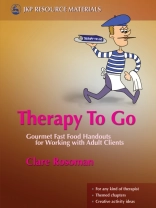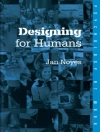This convenient collection of handouts provides a wide range of ready-made activities for all kinds of therapists working on a professional level with adult clients.
The activities within this book are suitable for any therapist, whether trained as a counsellor, psychologist, social worker, family therapist, psychiatrist or psychotherapist. The handouts provide creative approaches to a variety of presenting problems, including anxiety, anger, depression and low self-esteem. Fully photocopiable, the tools can be used to complement or expand upon a client’s treatment plan by selecting the activities that will help them best to meet their therapeutic goals.
This practical set of therapy tools will be invaluable in saving time for the busy therapist working with adults. There is also a companion volume, Therapy To Go: Gourmet Fast Food Handouts for Working with Child, Adolescent and Family Clients.
表中的内容
(Menu): Appetisers. 0.1 How to Use this Book. 0.2 Why Worksheets? 0.3 Clinical Issues. 0.4 About the Author. 0.5 Acknowledgements. Starters. Section 1: Getting Started. 1.1 Rapport Building. 1.2 Boundaries. 1.3 Expectations for Change. 1.4 Motivation for Change. 1.5 Unfolding the Story. Section 2: Therapy Basics. 2.1 Exploring and Expressing Feelings. 2.2 Monitoring. 2.3 Cognitive Behaviour Therapy. 2.4 Emotional Regulation. 2.5 Goal Setting. 2.6 Problem solving. Main Course. Section 3: Anxiety Issues. 3.1 Psychoeducation. 3.2 Increasing Awareness. 3.3 Anxiety Reduction Strategies. 3.4 Cognitive and Behavioural Strategies for Anxiety. Section 4: Depressive Issues. 4.1 Psychoeducation. 4.2 Behavioural Strategies for Depression. 4.3 Cognitive Strategies for Depression. Section 5: Anger Issues. 5.1 Psychoeducation. 5.2 Motivation for Managing Anger. 5.3 Anger Management Strategies. Section 6: Communication Skills. 6.1 Communication Skills. 6.2 Assertiveness. 6.3 Conflict Resolution. 6.4 Social Skills. Dessert. Section 7: Self-Esteem. 7.1 Psychoeducation. 7.2 Self-Awareness. 7.3 Increasing Self-Esteem. Section 8: Resilience. 8.1 Staying Positive. 8.2 Managing Stress. 8.3 Decision-making and Time Management. 8.4 Having Direction. 8.5 Relapse Prevention. Index.
关于作者
Clare Rosoman is a clinical psychologist currently managing a large not-for-profit psychology clinic in Queensland, Australia. She is also a consultant at Griffith University as a supervisor of post-graduate clinical psychology students in their work with clients. Dr Rosoman has previously worked in a variety of settings including psychiatric hospitals, private practice, schools and universities, and has published several papers in the area of children’s social functioning and antisocial behaviour.












